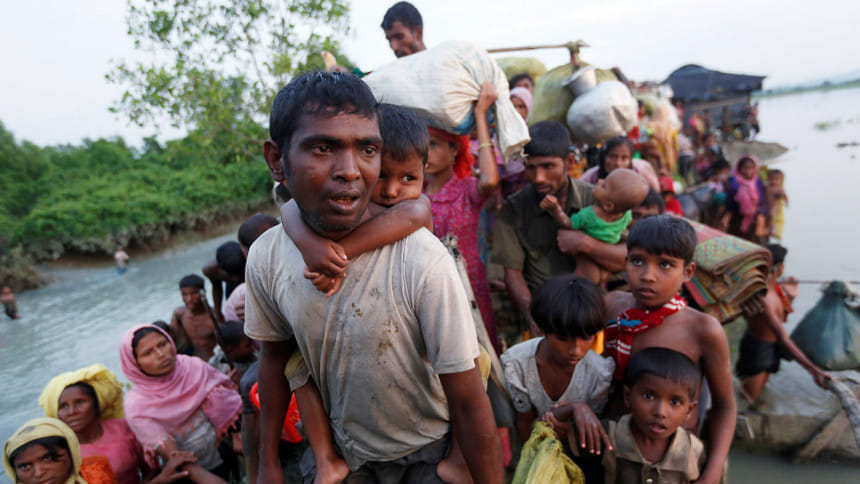Rohingya Crisis: China recipe not working

The Chinese recipe for resolving the Rohingya crisis is not working. Yet, Beijing is insisting on it.
Over the last 10 months, China has been speaking for resolution of the crisis through bilateral efforts between Bangladesh and Myanmar. After last year's brutal crackdown on Rohingyas by the Myanmar military, Beijing had also offered mediation between the two countries to resolve the crisis.
But, the continuous Rohingya influx into Bangladesh since last August after fresh violent military crackdown on them shows the Chinese recipe is not the right one.
Moreover, the Myanmar government's latest devious offer to take back only a few thousand Rohingyas through verification shows the ineffectiveness of the Chinese recipe.
Naypyidaw announced that repatriation of the Rohingyas must be done on the basis of verification of the refugees in line with the criteria agreed on by the two countries in a joint statement in 1992.
If the 1992 agreement is followed, only around 14,000 Rohingyas may get the chance of repatriation, if at all. As the Kofi Annan Commission set up by Suu Kyi this year reported that around 4,000 Rohingyas out of one million have been recognised as citizens or naturalised citizens. Around 10,000 more Rohingyas got national verification cards considered as a preparatory step towards citizenship. But the reality is that more than six lakh Rohingyas have already arrived in Bangladesh since August 25.
There is more of Myanmar's devious tactic. It has estimated it can take back only a handful of Rohingya refugees from Bangladesh per day through verification under the 1992 agreement, according to a report in the Irrawaddy on Monday.
"We can only process about 150 [refugees] in a checkpoint per day as we have to scrutinize and check their information," said U Myint Kyaing, permanent secretary of the Ministry of Labour, Immigration and Population.
This means even if Myanmar agrees to take back more Rohingyas through bilateral efforts, the repatriation will be a lengthy process. Nobody knows when it will be completed.
The Chinese ambassador in Dhaka on October 29 however hoped for a peaceful resolution to the crisis soon. He also said: "We hope our two brothers will sit down and solve this problem. I did see that there's some visible progress in terms of discussion."
Earlier, in April this year, Chinese special envoy Sun Guoxiang, who visited Dhaka, urged Bangladesh to resolve the row with Myanmar bilaterally. He also said Beijing stood ready to help in the matter. The envoy urged Bangladesh not to internationalise the issue.
Six months down the line the special envoy visited Dhaka again last week with the same messages.
China has also been opposing foreign interference in Myanmar. Its policy has made the UN Security Council unable to take any action against the Myanmar military although the forces have been accused of conducting ethnic cleansing on the Rohingya.
In October last year, the Myanmar military launched a crackdown on Rohingyas that forced around 90,000 to cross border into Bangladesh. In February this year, China offered itself as a mediator between Myanmar and Bangladesh to resolve the crisis.
The Myanmar government has rejected the mediation offer. But China did not reassess its stance; rather it has kept backing Myanmar and insisting on resolving the crisis through bilateral means.
In March this year, China, backed by Russia, blocked a short UNSC press statement on Myanmar which would have "noted with concern renewed fighting in some parts of the country and stressed the importance of humanitarian access to all affected areas".
After eruption of the ongoing violence on August 25, the UNSC sat at a close-door meeting at the end of August and discussed the situation. But the Chinese ambassador strongly opposed UN's involvement.
In the wake of global outcry against the atrocities, China and Russia allowed the Security Council to issue only a press statement urging Myanmar to end violence against the Rohingya. But due to their opposition, the statement was not strongly worded.
China and Russia again did not pay heed to the global outcry at the end of September's open meeting held amid exodus of Rohingyas to Bangladesh from Rakhine state of Myanmar and the UN chief's call for taking strong action.
Sticking doggedly to their stances, Beijing and Moscow rather questioned the UNSC's jurisdiction to take any measure and argued that any interference would worsen the situation in Myanmar.
China's deputy UN ambassador condemned "recent violent attacks" in Myanmar but said "there is no quick fix" to the plight of the Rohingyas.
In 2007 and 2009, China backed by Russia also killed measures in the UNSC. The draft resolutions would have urged Myanmar to ease repression and release political prisoners, including Aung San Suu Kyi.
China, whose investment in Myanmar reached $18.53 billion up to January 2017 and considers Myanmar an important tool in its One Belt, One Road initiative, ignored the fact that its "strategic partner" Bangladesh is suffering because of the ethnic cleansing in Myanmar.
It has already become clear that the Chinese recipe for resolving the Rohingya crisis bilaterally could not improve the situation. One thing is however evident that China's policy keeps benefiting the Myanmar military, not Bangladesh, though the latter has been bearing the burden of the Rohingyas.
If China is sincere in wanting a resolution, it needs to make fresh efforts to change Myanmar's attitude towards the Rohingya. Beijing needs to intervene out of humanitarian concern and focus less on mere economic and commercial interests in Myanmar.

 For all latest news, follow The Daily Star's Google News channel.
For all latest news, follow The Daily Star's Google News channel. 








Comments